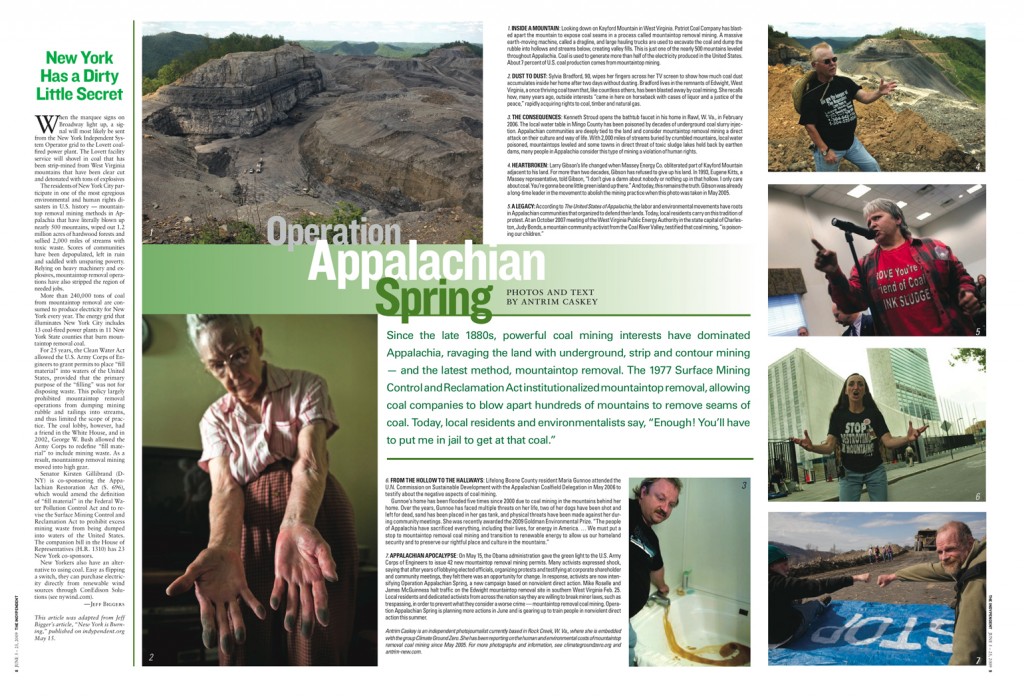22 Jun 2009: Opinion
A Plea To President Obama: End Mountaintop Coal Mining
Tighter restrictions on mountaintop removal mining are simply not enough. Instead, a leading climate scientist argues, the Obama administration must prohibit this destructive practice, which is devastating vast stretches of Appalachia.
by James Hansen
At 11:36 am on an April morning in 2006, Larry Gibson and his beloved Dog, stand at the edge of his property on Kayford Mountain, just a massive diesel fueled blast implodes yet another piece of this precious place. ..Kayford Mountain has been the home to Gibson’s family since the turn of the 20th century and the coal companies have vowed to take all the rich low sulfur coal that lies beneath Gibson. photograph (C) antrim caskey, 2006
President Obama speaks of “a planet in peril.” The president and the brilliant people he appointed in energy and science know that we must move rapidly to carbon-free energy to avoid handing our children a planet that has passed climate tipping points.
The science is clear. Burning all fossil fuels will destroy the future of young people and the unborn. And the fossil fuel that we must stop burning is coal. Coal is the critical issue. Coal is the main cause of climate change. It is also the dirtiest fossil fuel — air pollution, arsenic, and mercury from coal have devastating effects on human health and cause birth defects.
Recently, the administration unveiled its new position on mountaintop coal mining and set out a number of new restrictions on the practice in six Appalachian states. These new rules will require tougher environmental review before blowing up mountains. But it’s a minimal step.
The Obama administration is being forced into a political compromise. It has sacrificed a strong position on mountaintop removal in order to ensure the support of coal-state legislators for a climate bill. The political pressures are very real. But this is an approach to coal that defeats the purpose of the administration’s larger efforts to fight climate change, a sad political bargain that will never get us the change we need on mountaintop removal, coal or the climate. Coal is the linchpin in mitigating global warming, and it’s senseless to allow cheap mountaintop-removal coal while the administration is simultaneously seeking policies to boost renewable energy.
Mountaintop removal, which provides a mere 7 percent of the nation’s coal, is done by clear-cutting forests, blowing the tops off of mountains, and then dumping the debris into stream beds — an undeniably catastrophic way of mining. This technique has buried more than 800 miles of Appalachian streams in mining debris and by 2012 will have serious damaged or destroyed an area larger than Delaware. Mountaintop removal also poisons water supplies and pollutes the air with coal and rock dust. Coal ash piles are so toxic and unstable that the Department of Homeland Security has declared that the location of the nation’s 44 most hazardous coal ash sites must be kept secret. They fear terrorists will find ways to spill the toxic substances. But storms and heavy rain can do the same. A recent collapse in Tennessee released 100 times more hazardous material than the Exxon-Valdez oil spill.
If the Obama administration is unwilling or unable to stop the massive environmental destruction of historic mountain ranges and essential drinking water for a relatively tiny amount of coal, can we honestly believe they will be able to phase out coal emissions at the level necessary to stop climate change? The issue of mountaintop removal is so important that I and others concerned about this problem will engage in an act of civil disobedience on June 23rd at a mountaintop removal site in Coal River Valley, West Virginia.
Experts agree that energy efficiency and carbon-free energies can satisfy our energy needs. Coal left in the ground is useful. It holds up the mountains, which, left intact, are an ideal site for wind energy. In contrast, mountaintop removal and strip mining of coal is a shameful abomination. Mining jobs have shrunk to a small fraction of past levels. With clean energy, there could be far more, green-energy jobs, and the government could support the retraining of miners, to a brighter, cleaner future.
Politicians may have to make concessions on what is right for what is winnable. But as a scientist and a citizen, I believe the right course is very clear: The climate crisis demands a moratorium on new coal-fired power plants that do not capture and safely dispose of all emissions. And mountaintop removal, providing only a small fraction of our energy, should be permanently prohibited.
President Obama remains the best hope, perhaps the only hope, for real change. If the president uses his influence, his eloquence, and his bully pulpit, he could be the agent of real change. But he does need our help to overcome the political realities of compromise.
We must make clear to Congress, to the EPA, and to the Obama administration that we the people want mountaintop removal abolished and we want a move toward a rapid phase-out of coal emissions now. The time for half measures and caving in to polluting industries is over. It is time for citizens to demand — yes, we can.


